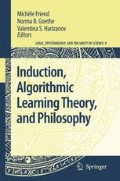Abstract
Scientific methods may be viewed as procedures for converging to the true answer to a given empirical question. Typically, such methods converge to the truth only if certain empirical presuppositions are satisfied, which raises the question whether the presuppositions are satisfied. Another scientific method can be applied to this empirical question, and so forth, occasioning an empirical regress. So there is an obvious question about the point of such a regress. This paper explains how to assess the methodological worth of a methodological regress by solving for the strongest sense of single-method performance that can be achieved given that such a regress exists. Several types of regresses are “collapsed” into corresponding concepts of single method performance in this sense. The idea bears on some other issues in the philosophy of science, including Popper’s falsificationism and its relationship to Duhem’s problem.
Access this chapter
Tax calculation will be finalised at checkout
Purchases are for personal use only
Preview
Unable to display preview. Download preview PDF.
References
Berger, W. and Labeyrie, L. (1987). Proceedings of the NATO Advanced Research Workshop on Abrupt Climatic Change: Evidence and Implications, Dordrecht: Reidel.
Gold, E.M. (1965). “Limiting Recursion”, Journal of Symbolic Logic 30, 28–48.
Gold, E.M. (1967). “Language Identification in the Limit”, Information and Control 10, 447–474.
Hinman, P. (1978). Recursion Theoretic Hierarchies, New York: Springer-Verlag.
Hitchcock, C. (ed.) (2004). Contemporary Debates in the Philosophy of Science, Oxford: Blackwell.
Jain, S., Osherson, D., Royer, J.S. and Sharma, A. (1999). Systems That Learn: An Introduction to Learning Theory, 2nd ed., Cambridge (Mass.): MIT Press.
Kelly, K. (1996). The Logic of Reliable Inquiry, Oxford: Oxford University Press.
Kelly, K. (2000a). “Naturalism Logicized”, in Nola, R. and Sankey, H. [16], 177–210.
Kelly, K. (2000b). “The Logic of Success”, The British Journal for the Philosophy of Science 51, 639–666.
Kelly, K. (2004). “Uncomputability: The Problem of Induction Internalized”, Theoretical Computer Science 317, 227–249.
Kelly, K. and Glymour, C. (2004). “Why Probability Does Not Capture the Logic of Scientific Justification”, in Hitchcock, C. [5], 94–114.
Kuhn, T.S. (1970). The Structure of Scientific Revolutions, Chicago: University of Chicago Press.
Laudan, L. (1980). “Why Was the Logic of Discovery Abandoned?”, in Nickles, T. [15].
Martin, E. and Osherson, D. (1998). Elements of Scientific Inquiry, Cambridge (Mass.): MIT Press.
Nickles, T. (ed.) (1980). Scientific Discovery, Logic, and Rationality, Dordrectht: Reidel.
Nola, R. and Sankey, H. (eds.) (2000). After Popper, Kuhn and Feyerabend, Dordrecht: Kluwer.
Osherson, D., Stob, M. and Weinstein, S. (1986). Systems That Learn: An Introduction to Learning Theory for Cognitive and Computer Scientists, Cambridge (Mass.): MIT Press.
Popper, K. (1968). The Logic of Scientific Discovery, NewYork: Harper and Row.
Putnam, H. (1963). “‘Degree of Confirmation’ and Inductive Logic”, in Schilpp, P.A. [22].
Putnam, H. (1965). “Trial and Error Predicates and the Solution to a Problem of Mostowski”, Journal of Symbolic Logic 30, 49–57.
Ruse, M. (1979). The Darwinian Revolution: Science Red in Tooth and Claw, Chicago: University of Chicago Press.
Schilpp, P.A. (ed.) (1963). The Philosophy of Rudolf Carnap, LaSalle (Ill.): Open Court.
Author information
Authors and Affiliations
Editor information
Editors and Affiliations
Rights and permissions
Copyright information
© 2007 Springer
About this chapter
Cite this chapter
Kelly, K.T. (2007). How to Do Things with an Infinite Regress. In: Friend, M., Goethe, N.B., Harizanov, V.S. (eds) Induction, Algorithmic Learning Theory, and Philosophy. Logic, Epistemology, and the Unity of Science, vol 9. Springer, Dordrecht. https://doi.org/10.1007/978-1-4020-6127-1_8
Download citation
DOI: https://doi.org/10.1007/978-1-4020-6127-1_8
Publisher Name: Springer, Dordrecht
Print ISBN: 978-1-4020-6126-4
Online ISBN: 978-1-4020-6127-1
eBook Packages: Humanities, Social Sciences and LawPhilosophy and Religion (R0)

